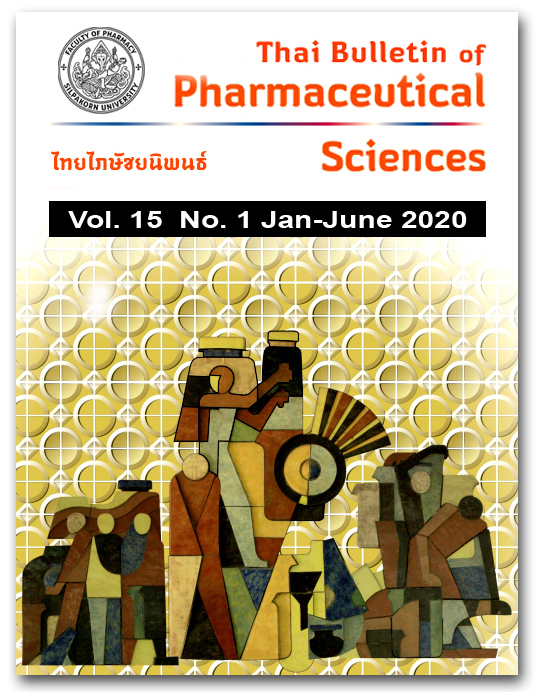DEVELOPMENT OF PROMOTION PROCESS FOR ANTIRETROVIRAL ACCESS IN SEXUAL PARTNERS OF HIV INFECTED PATIENTS
DOI:
https://doi.org/10.69598/tbps.15.1.1-16Keywords:
antiretroviral access, HIV infected patient, sexual partner, HIV care clinicAbstract
This action research aimed to develop a process to promote access to antiretroviral (ARV) drugs for sexual partners of HIV infected patients. The participation of a multidisciplinary team and HIV infected patients was done in an HIV care clinic at Phonthong Hospital in Roi-et Province, Thailand. The team was comprised of a physician, a pharmacist, a registered nurse, and HIV patients. Process development consisted of three stages. Stage one was planning and included two focus discussion groups to set process protocols. Stage two was acting and observing, in which the planned process protocols were implemented for 5 months with 81 HIV infected couples and their sexual partners. Stage three was reflecting on the process implementation, which included a focus discussion group by 3 practitioners at the HIV clinic. The results showed that in stage one, 3 practical protocols with 6 steps were established to promote access to ARV drugs for the sexual partners of the HIV infected patients. Following the implementation of stage two, results showed that 1) six of the HIV infected patients had disclosed their HIV status to their sexual partners 2) eight sexual partners had been diagnosed with HIV 3) five sexual partners had accessed ARV drugs 4) all five of the sexual partners (100%) who accessed the ARV drugs had knowledge about HIV and its treatment and willingly adhered to it, and 5) three sexual partners tested negative for HIV ≥ 1 year accessed HIV repeated test. In stage three, practitioners in the HIV care clinic had added one more protocol step to cover more at-risk people. This step resulted in two of the sexual partners who tested negative for HIV being retested ≥ 1 year. It is concluded that developing a process to promote access to ARV drugs for sexual partners of HIV infected patients enabled them to disclose their HIV to their sexual partners. This process may lead to a policy to eradicate AIDS in 2030.
References
2. Cohen MS, Chen YQ, McCauley M, Gamble T, Hosseinipour MC, Kumarasamy N, et al. Antiretroviral therapy for the prevention of HIV-1 transmission. N Engl J Med [Internet]. 2016 [cited 2018 Oct 20];375(9):830–9. Available from: https://www.nejm.org/doi/10.1056/ NEJMoa1600693
3. Bureau of AIDS, TB and STIs. Thailand national guidelines on HIV/AIDS treatment and prevention 2017 [Internet]. Nonthaburi: The Bureau; 2017 [cited 2018 Sep 25]. Available from: http://www.thaiaidssociety.org/images/ PDF/hiv_thai_guideline_2560.pdf (in Thai)
4. Bureau of AIDS, TB and STIs. National AIDS Committee. National strategy for ending AIDS 2017 - 2030 [Internet]. Nonthaburi: The Bureau; 2017 [cited 2018 Aug 16]. Available from: http://aidssti.ddc.moph.go.th/contents/ view/1759 (in Thai)
5. World Health Organization. Guidelines on HIV self-testing and partner notification: supplement to consolidated guidelines on HIV testing services [Internet]. Geneva: WHO; 2016 [cited 2018 Sep 25]. Available from: https://apps.who.int/iris/bitstream/handle/10665/251655/9789241549868-eng.pdf
6. Pamulila S. Action research [Internet]. Ubon Ratchathani: Faculty of Nursing, Ubon Ratchathani University; 2012 [cited 2018 Sep 23]. Available from: http://www.nurse.ubu.ac.th/ sub/knowledgedetail/Actionresearch.pdf (in Thai)
7. Burns A. Action research. In: Brown JD, Coombe C, editors. The Cambridge guide to research in language teaching and learning. Cambridge: Cambridge University Press; 2015. p.99-104.
8. Baipluthong B, Anekthananon T, Munsakul W, Jirajariyavej S, Asavapiriyanont S, Hancharoenkit U, et al. Implementation and assessment of a prevention with positives intervention among people living with HIV at five hospitals in Thailand. PLOS ONE [Internet]. 2017 [cited 2018 Sep 23];12(2):e0170558. Available from: https://www.ncbi.nlm.nih.gov/pmc/articles/PMC5291364/
9. Dessalegn NG, Hailemichael RG, Shewa-amare A, Sawleshwarkar S, Lodebo B, Amberbir A, et al. HIV disclosure: HIV-positive status disclosure to sexual partners among individuals receiving HIV care in Addis Ababa, Ethiopia. PLOS ONE [Internet]. 2019 [cited 2019 May];14(2):e0211967. Available from : https://journals.plos.org/plosone/article?id=10.1371/journal.pone.0211967
10. Haberlen SA, Nakigozi G, Gray RH, Brahmbhatt H, Ssekasanvu J, Serwadda D, et al. Antiretroviral therapy availability and HIV disclosure to spouse in Rakai, Uganda: a longitudinal population-based study. J Acquir Immune Defic Syndr [Internet]. 2016 [cited 2018 Oct 20];69(2):241-7. Available from: https://www.ncbi.nlm.nih.gov/pmc/ articles/PMC4445459/
11. UNICEF Thailand. Situational analysis of young people at high risk of HIV exposure in Thailand: synthesis report [Internet]. Bangkok: UNICEF; 2014 [cited 2018 Oct 20]. Available from: https://www.unicef.org/thailand/reports/ situational-analysis-young-people-high-risk-hiv-exposure-thailand
Downloads
Published
How to Cite
Issue
Section
License
All articles published and information contained in this journal such as text, graphics, logos and images is copyrighted by and proprietary to the Thai Bulletin of Pharmaceutical Sciences, and may not be reproduced in whole or in part by persons, organizations, or corporations other than the Thai Bulletin of Pharmaceutical Sciences and the authors without prior written permission.



